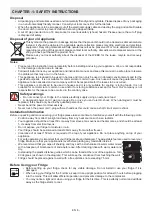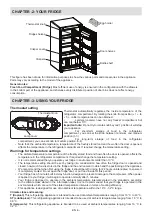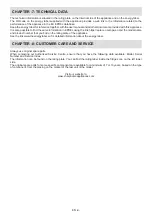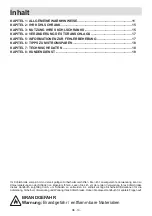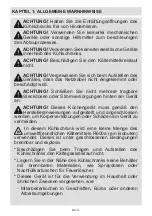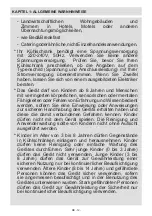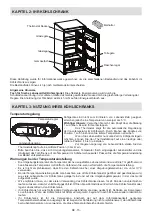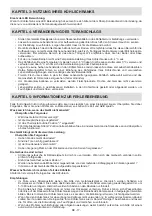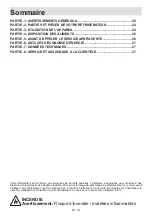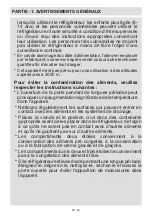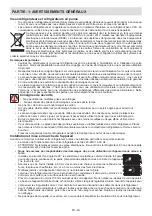
EN -8-
If your refrigerator is not working properly,it may be a minor problem, therefore check the following, before calling an
electrician to save time and money.
What to do if your refrigerator does not operate ;
Check that ;
•
There is no power,
•
The general switch in your home is not disconnected ,
• The thermostat setting is on «•» position,
• The socket is not sufficient. To check this, plug in another appliance that you know which is working into the
same socket.
What to do if your refrigerator performs poorly ;
Check that ;
•
You have not overloaded the appliance ,
•
The doors are closed perfectly ,
•
There is no dust on the condenser ,
•
There is enough place at the rear and side walls.
Your fridge is too noisy.
The cooling gas which circulates in the refrigerator circuit may make a slight noise(bubbling sound) even when the
compressor is not running. Do not worry this is quite normal. If these sounds are different check that ;
The appliance is well levelled ,
Nothing is touching the rear.
If there is water in the lower part of the refrigerator ;
Check that ;
The drain hole for defrost water is not clogged insert a space please (Use defrost drain plug to clean the drain hole)
Recommendations
•
In instances of a power cut unplug the appliance. This prevents damage to the compressor. You should delay
plugging in 5 – 10 minutes after you regain power supply. This will avoid damage to components.
•
The cooling unit of your refrigerator is hidden in the rear wall. Therefore, water droplets or ice may occur on the
rear surface of your fridge due to the operation of the compressor in specified intervals. This is normal. There
is no need to perform a defrosting operation unless the ice is excessive.
•
If you will not use your fridge for a long time (e.g. in summer holidays) unplug it. Clean your fridge according to
chapter cleaning and leave the door open to prevent humidity and smell.
•
If the problem persists after you have followed all the instructions above, please consult an authorised service
provider.
CHAPTER -6: TIPS FOR SAVING ENERGY
1. Always allow foodstuffs to cool before storing in the appliance.
2. Thaw food in the fridge compartment, this helps save energy.
CHAPTER -4: FOOD STORAGE GUIDANCE
•
To reduce frost build up never place liquids with unsealed containers in the fridge compartment.
•
Allow warn or hot food to cool down before storing. This helps reduce power consumption.
•
To avoid frost buildup ensure that nothing is stored touching the back wall.
•
The coldest area of the refrigerator is at the bottom. We recommend to use this area to store food that will perish
easily, such as fish, ready meals, baked goods or dairy products. The warmest area is the top shelf of the door.
We recommend you store butter or cheese here.
• For normal working conditions, it will be sufficient to adjust the temperature setting of your refrigerator to +4 °C.
•
The temperature of the fridge compartment should be in the range of 0-8 °C, fresh foods below 0 °C are iced
and rotted, bacterial load increases above 8 °C, and spoils.
•
Do not put hot food in the refrigerator immediately, wait for the temperature to pass outside. Hot foods increase
the degree of your refrigerator and cause food poisoning and unnecessary spoiling of the food.
• Meat, fish, etc. should be store in the chiller compartment of the food, and the vegetable compartment is
preferred for vegetables. (if available)
•
To prevent cross contamination, meat products and fruit vegetables are not stored together.
•
Foods should be placed in the refrigerator in closed containers or covered to prevent moisture and odors.
CHAPTER -5: TROUBLESHOOTING
Summary of Contents for SJ-LE160M0X-EU
Page 101: ......
Page 102: ......
Page 103: ......
Page 104: ...Service Support Visit Our Website sharphomeappliances com 52370281 ...






